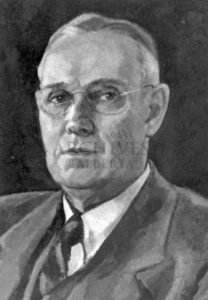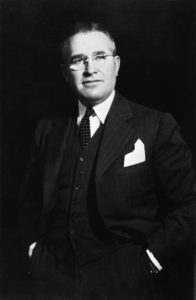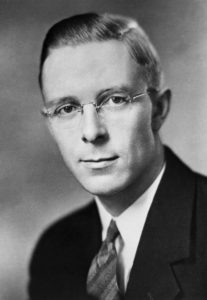Updated 16 December 2020
In this remarkable and lengthy undated memorandum from Jim Dinning, a future Treasurer and candidate for the premiership of Alberta, to Lou Hyndman, Dinning highlights some historical issues which still confound Alberta finances to this day. (The italics are Dinning classification of issues for Treasurer Hyndman.)
Central to preparing a budget in the 1980s was the reliability of non-renewable resource revenue. Back in the 1930s, 1940s, and 1950s natural resource revenue was also front of mind. The growing dependence on resource revenue was underlined in Ernest Manning’s 1950 budget.
A dilemma for provincial treasurers then, in 1980, and today is the balancing of pressures for spending, the proper stewardship of resource revenue, and the need to contain “insatiable” demands from various interest groups. Public debt was also an important issue for treasurers before the 1945 debt reorganization and the Leduc oil boom.
As the pace of development of the oil and natural gas fields unfolded, Manning was mindful of the need for sound stewardship which meant conservation and ensuring long-term security of supply, issues that seem irrelevant today but were important in 1980 before the full scale development of the Alberta oilsands.
1930- February 11
Fed-Prov Agreement on Natural Resources
This budget address was delivered by Hon. R. G. Reid, Treasurer of the Province.

In his opening remarks, Hon. Reid made reference to two outstanding events that happened during the present fiscal year- 1929-30. The first was the transfer of the Northern Railways to the C.P.R and the C.N.R. The second one, which would make for an interesting reference in your address, was the agreement between the federal and Alberta governments which transferred natural resources to the province “on terms much more advantageous to Alberta and would have been possible even a year ago.”
Mr. Reid went on to say, “ what the resources will mean to the province economically it is too early to say. In the first year it is unlikely that much profit will accrue to the Province through their administration. However, as time goes on and mineral developments proceed, the revenues from this source should be considerable. While all this is true, great advantage will come to the Province from the broadening of the basis from which revenues can be raised, with the attendant possibility of a more equitable distribution of the burden of government.”
Increasing costs of Services-and Demands
A comment worthy of note regarding continually increasing budgetary costs- “Services must not be demanded without a full appreciation of their cost in taxes. On the other hand, the abolition of certain taxes should not be mooted without realization of the fact that such recessions demand curtailment of public services. Public amenities and taxation must always be set one against the other. One may not be tampered with without disturbing the other. Adequate sources of revenue are the props of complete public service – take one of them away, and something will have to go with it. There is nothing more certain than that. “
Agriculture is our strong card- Oil is an uncertainty
Regarding oil production – “ during the past two years this province has assumed an undoubted preeminence in the production of oil. We are now producing more oil than all Canada produced 4 years ago. During the war much drilling has been done with increased production as a result. Practically everything that has happened has served to strengthen our conviction of the important contribution that oil will make to the mineral wealth of the Province.” He goes on to say “While there is no doubt that this province will be dependent on its industrial and mineral development more and more as time goes on, there is no Province in Canada that can equal Alberta in potential resources for Agriculture. It is not hard to visualize agricultural expansion and what it will mean to Northern Alberta. It is more difficult for us to realize what changes mineral development will bring to that territory. 20 years of this dual development will undoubtedly surpass anything that the Province has yet seen.”

1940 – February 12
The speech was delivered by Hon. S. E. Low, Treasurer of the Province.
Wartime Budget
This was a war time budget and the address reflected that.
“ I am not unmindful of the added responsibility of my office in framing a budget for a year which, under war conditions, can only bring increasing problems on the shoulders of all governments and uncertainties with respect to both revenue and expenditures. It is admitted that adjustment and curtailment of certain governmental services may have to be made to meet the conditions arising as the war progresses. The nature and extent of such adjustments cannot be forecast; Nor is there an immediate necessity for us to make provision for them at this time. The budget I have placed before you recognizes the necessity of this Government maintaining its essential services, such as Health and Education, and also the necessity of protecting our investment in roads and public buildings. In addition, moderate sums have been placed in the capital section for necessary extensions and addition to Public Institutions. It should be kept in mind that no increase in the Public Debt of the Province is contemplated to cover our budgetary requirements; and I should also mention at the outset that no increase in taxation is being imposed.”
Petroleum Production
Since I mainly reviewed budgets with the year ending in zero (0), this is the first budget address that speaks of petroleum development. “ Thirty-five wells were drilled or drilling in fields other than Turner Valley; and it is hoped that further extensions to the present producing areas will be found. Thirty-five wells were completed as crude producers in the Turner Valley during the year; and ninety-nine wells are now producing crude oil in that field. The production of all fields totals 7,594,311 barrels, – an increase of 852,373 barrels (all over the previous year); and the total petroleum production to the end of the past calendar year reached a total of 28,108,752 barrels. The value of all products of our natural resources total $27,347,203,- an increase of $899,766.”
If the statistics can be found and the comparison can be made to back up the argument, it might be interesting to put together figures that will show our depleting non-renewable resources.
Provincial Debt
The province’s debt position was a topic of great concern during the 30s and 40s. “ In closing, Mister Speaker, I wish to briefly refer to our debenture debt position. The statements presented prove conclusively that with a refunding all of our debt at rates of Interest comparable with the rates we are now offering in payment, this Province can carry on its essential services and reasonable and necessary Capital expenditures without incurring an ever-increasing burden of debt. Funds to meet the interest at the reduced rates are provided as in the past; and I assure you the funds are not only in an account apart from our General Revenue Fund, but they have not been used for any purpose other than that for which they were set aside. We intend to continue this policy and to pursue every course possible to evolve an equitable plan of refunding our debenture debt, both to the debenture holder and to the Province.”

1950 – March 3
Historic Expenditures/ Revenues
This budget was presented by Hon. Ernest C. Manning, Premier and Treasurer of the Province.
In his opening remarks, Mr. Manning spoke of the responsibility/burden of ever increasing revenues and expenditures. Speaking to the budget as setting an all-time record in both these areas, he said, “It reflects clearly and unmistakably the unprecedented era of progress and development which, in this Province, it is our good fortune to witness and enjoy. To whom much is given, of him shall much be expected- and the honourable Members of this Assembly must bear in mind our correspondingly increased responsibility to use wisely and in the best interest of all, the increased measure of material abundance with which our province is indued (sic).
Demands/Pressures
As legislators, we are confronted with two extremes in public attitude as a result of the improved economic and financial position of the province. On one hand there is a tendency to regard increased revenue from the development of our resources as license for reckless spending and irresponsible commitments to satisfy the demands of minority pressure groups without due regard to future consequences or the best interest of our people as a whole.
On the part of others, there is a tendency to over caution, which would unduly retard the bold and vigorous action necessary to continued progress and development. The Government does not subscribe to either of these extremes.
The budget takes cognizant of our responsibility as legislators to exercise sound judgment in the expenditure of public revenues and to safeguard the future as well as the present interest of those we are privileged to represent.”
Exploration Indicators
Natural resources- it would be interesting to get an updated comparison of the following: “approximately $25,000,000 was spent in Alberta in the search for oil in 1947; $50,000,000 in 1948; $100,000,000 in 1949 and it is estimated that in 1950 over $150,000,000 will be spent in the work of exploration and development. The footage drilling exploration and development was 882,358 feet in 1947, 1,663, 687 feet in 1948, 3,201,897 feet in 1949, making a total of 5,747,943 feet or 1,089 miles for the 3-year.period.”
Natural Gas Exports
We might restate our commitment to increase exports of natural gas in a similar way to Mr. Manning’s 1950 speech; “ the government’s first and foremost responsibility is to protect the interests and welfare of the people of this Province and we are determined to carry out this responsibility to the best of our ability. To this and, no application for the export of natural gas will be given favorable consideration until such time as the Government is satisfied beyond question that under sound conservation and proration practices there are sufficient gas reserves to meet the present and future domestic and Industrial requirements of the province.
When fully satisfied a surplus exists, over and above these requirements, sufficient to justify export under sound conservation and proration practices, the Government will approve the export of such surplus with each application being considered on its own merits and in the light of all prevailing circumstances. Furthermore, it will be a condition of any export permit that Canadian requirements must be given first priority.”
Impact of Natural Resource Revenue
If we wish to drive home to your budget address audience our increasing dependence on non-renewable resource revenues, we might include a chart and explanation explanation similar to the following:
“ Honourable members will be interested to know that the percentage of total provincial revenue accruing from various sources is undergoing a significant change as indicated by the following table:
|
Percentage of revenue on Income Account from various sources on a comparative basis for the fiscal years 1948-49, 1949-50, 1950-51 |
|||
|
1948-49 |
1949-50 |
1950-51 |
|
|
Dominion-Provincial Tax Transfer Agreement |
34.53% |
28.80% |
24.25% |
|
Car and Truck Licenses, etc. and Gasoline Tax |
24.50% |
21.17% |
20.50% |
|
Liquor Board Profits |
19.90% |
15.70% |
13.75% |
|
Natural Resources |
10.90% |
24.69% |
31.75% |
|
All other Sources |
10.17% |
9.64% |
9.75% |
|
Total |
100.00% |
100.00% |
100.00% |
“From these figures it will be noted that monies accruing to the Public Treasury from the orderly development of our natural resources have replaced taxation as our major source of income and will account for approximately one-third of our total provincial revenue for the ensuing year.”
Dependence on Oil Revenue Source Continued Boom
The last two pages of Mr. Manning’s 1950 budget address are extremely good in that they provide a valuable comparison which outlines our dependence on non-renewable revenues. It also shows the position we might be in without these revenues and therefore the necessity of our having to increase taxes significantly. As well, he points out that we should not be blind given our prosperity in Alberta in view of the fact that the rest of Canada and the world do not share the same prosperity. I think that this section of your budget speech could address the same concern. ( I have attached a copy of these last two pages for your information.)
Source: Provincial Archives of Alberta, PR1986.0245, Box #45, File # 641.(Hyndman papers)
Related Posts
Manning-budget-speech-1950-excerpts